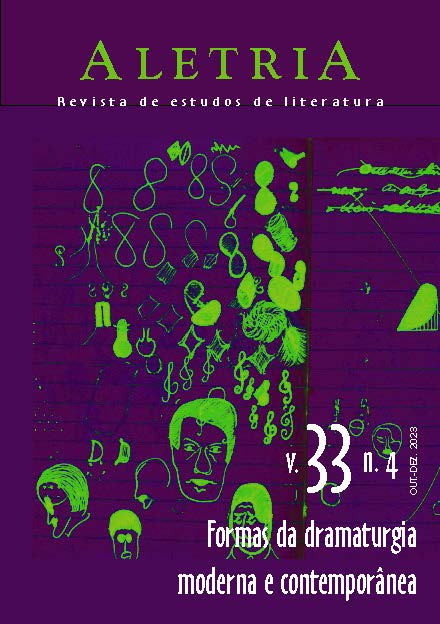A mancha roxa, o teatro da peste e o direito à violência
Palabras clave:
dramaturgia, distopia, teatro da peste, violência, Plínio MarcosResumen
Resumo: Em A mancha roxa, Plínio Marcos representa mulheres assoladas por um flagelo inominável, perceptível apenas nas manchas da epiderme e nos sintomas clínicos da peste. No drama, exploradas pela carceragem, as personagens estão condenadas ao extermínio pela doença e ao esquecimento no aparelho punitivo. Assim, o texto analisa as políticas de extermínio – a violência administrada, a fobia generalizada, o imaginário da peste –, as imagens distópicas do desastre epidêmico e as formas de sobrevivência das personagens. Na segunda parte, depois da composição da fábula teatral e das políticas de extermínio, o estudo explora o discurso de insubmissão das presas, na defesa do direito a uma violência messiânica e redentora.
Palavras-chave: dramaturgia; distopia; teatro da peste; violência; Plínio Marcos.
Abstract: In A mancha roxa, Plínio Marcos portrays women plagued by an unnameable scourge, perceptible only in the stains of the epidermis and in the clinical symptoms. In the drama, exploited by imprisonment, the characters are condemned to extermination by illness and oblivion in the punitive apparatus. Thus, this text analyzes the extermination policies – the administered violence, the generalized phobia, the imagery of the plague –, the dystopian images of the epidemic disaster and the characters’ ways of survival. In the second part, after the composition of the theatrical fable and the extermination policies, the study explores the discourse of insubordination of the prisoners, in defense of the right to a messianic and redemptive violence.
Keywords: dramaturgy; dystopia; theater of plague; violence; Plínio Marcos.
Descargas
Citas
AGAMBEN, Giorgio. Meios sem fim: notas sobre a política. Tradução de Davi Pessoa. Belo Horizonte: Autêntica, 2015a.
AGAMBEN, Giorgio. Nudez. Tradução de Davi Pessoa. Belo Horizonte: Autêntica, 2015b.
AGAMBEN, Giorgio. Profanações. Tradução de Selvino J. Assmann. São Paulo: Boitempo, 2007.
BENJAMIN, Walter. Para uma crítica da violência. In: BENJAMIN, Walter. Escritos sobre mito e linguagem. Tradução de Susana Kampff Lages e Ernani Chaves. São Paulo: Duas Cidades; Editora 34, 2011. p. 121-156.
BENJAMIN, Walter. Sobre a crítica do poder como violência. In: BENJAMIN, Walter. O anjo da história. Tradução de João Barrento. Belo Horizonte: Autêntica, 2012a. p. 57-82.
BENJAMIN, Walter. Sobre o conceito de história. In: BENJAMIN, Walter. Magia e técnica, arte e política: ensaios sobre literatura e história da cultura. Tradução de Sergio Paulo Rouanet. 8. ed. São Paulo: Brasiliense, 2012b. p. 241-252.
DIDI-HUBERMAN, Georges. Sobrevivência dos vaga-lumes. Tradução de Vera Casa Nova e Márcia Arbex. Belo Horizonte: Editora UFMG, 2011.
MARCOS, Plínio. Obras teatrais: atrás desses muros. Organização Alcir Pécora. Rio de Janeiro: Funarte, 2016. (Obras teatrais, v. 1).
SARRAZAC, Jean-Pierre. O futuro do drama: escritas dramáticas contemporâneas. Tradução de Alexandra Moreira da Silva. Porto: Campos das Letras, 2002.
SARRAZAC, Jean-Pierre. Poética do drama moderno: de Ibsen a Koltès. Tradução de Newton Cunha, J. Guinsburg e Sonia Azevedo. São Paulo: Perspectiva, 2017.
SONTAG, Susan. Doença como metáfora. Aids e suas metáforas. Tradução de Rubens Figueiredo e Paulo Henriques Britto. São Paulo: Companhia das Letras, 2007.
Descargas
Publicado
Cómo citar
Número
Sección
Licencia
Derechos de autor 2024 Rainério dos Santos Lima (Autor)

Esta obra está bajo una licencia internacional Creative Commons Atribución 4.0.
Authors who publish with this journal agree to the following terms:Authors retain copyright and grant the journal right of first publication with the work simultaneously licensed under a Creative Commons Attribution Non-Commercial No Derivatives License that allows others to share the work with an acknowledgement of the work's authorship and initial publication in this journal.Authors are able to enter into separate, additional contractual arrangements for the non-exclusive distribution of the journal's published version of the work (e.g., post it to an institutional repository or publish it in a book), with an acknowledgement of its initial publication in this journal.Authors are permitted and encouraged to post their work online (e.g., in institutional repositories or on their website) prior to and during the submission process, as it can lead to productive exchanges, as well as earlier and greater citation of published work (See The Effect of Open Access).





